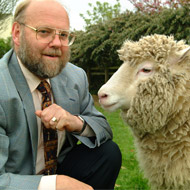
Project to find new ways to prevent and predict the disease
Dolly the Sheep creator Sir Ian Wilmut is backing an initiative to tackle Parkinson’s disease.
The renowned scientist announced his own diagnosis on World Parkinson’s Day (11 April) prior to the launch of a major research programme.
The initiative will see experts at the Universities of Edinburgh and Dundee unite in the pursuit of gaining a betetr understanding the disease.
“Initiatives of this kind are very effective not only because they bring more people together, but because they will include people with different experience and expertise,” said Professor Wilmut. “It was from such a rich seedbed that Dolly developed and we can hope for similar benefits in this project.”
The new partnership between the universities of Edinburgh and Dundee aims to investigate the causes of Parkinson’s disease and translate scientific discoveries into new treatments. The overall aim of the project is to find new ways to prevent and predict Parkinson's and to facilitate clinical testing of therapies aimed at slowing or reversing the progression of the disease.
Professor Dario Alessi from the University of Dundee said that in recent years, knowledge of genetics and biology underlining Parkinson’s disease ‘has exploded’. “I feel optimistic and it is not unrealistic that with a coordinated research effort, major strides towards better treating Parkinson's disease can be made," he said.
Dolly the sheep was created at the Roslin Institute in 1996 by a multidisciplinary research team led by Professor Wilmut. She was the first clone of an animal from an adult cell and her birth turned scientific thinking on its head.
The breakthrough paved the way for others to develop a method of using adult cells to produce reprogrammable cells that could develop into “induced pluripotent” stem cells or iPSCs.
Edinburgh scientists were the first in the UK to produce iPSCs in the lab from patients with Parkinson's disease. Researchers say these cells provide an invaluable resource for studying the mechanisms underlying the disease and testing potential drug treatments.
Dr Tilo Kunath from the University of Edinburgh said: “People with Parkinson's urgently require access to earlier and more accurate diagnosis, better prediction of how their disease will progress, and most importantly, the opportunity to participate in clinical trials of new treatments. This new research partnership aims to make these hopes a reality for people in Scotland.”
Image (C) University of Edinburgh



 RCVS Knowledge has welcomed Professor Peter Cockcroft as editor-in-chief for Veterinary Evidence.
RCVS Knowledge has welcomed Professor Peter Cockcroft as editor-in-chief for Veterinary Evidence.